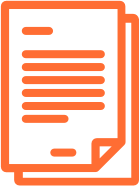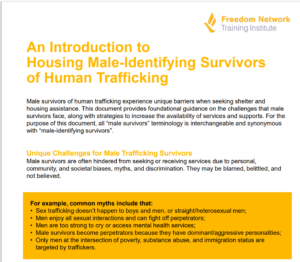The Resource Library includes fact sheets, promising practices, tools, templates, and training materials developed by subject-matter experts with direct experience working with survivors. Resource topics address current trends and challenges in the field.
Search Results 38 matching results for "Youth"
Familial Trafficking: Advancing Housing Practice Through Research
This webinar explores key findings from the RTI familial trafficking report and examines how these insights inform housing and service responses. The session focuses on shared learning around identification gaps, outreach and screening practices, and organizational approaches to better support survivors of familial trafficking.
Levels: Intermediate
Material Types: Webinars & Videos
Types of Trafficking: Sex Trafficking
Keywords: Awareness Data Housing Safety Planning Trauma Informed
Demographics: Youth
Vicarious Trauma in Anti-Trafficking Housing Work
Led by Katie Papke, LMSW, CAADC, CCHTVSP, and moderated by Freedom Network USA, This session explored the impact of vicarious trauma, common reactions to secondary trauma, and practical strategies for self-care, mindful regulation, and trauma-informed organizational practices—plus a moment to pause and breathe together.
Levels: Introductory
Material Types: Webinars & Videos
Types of Trafficking: Labor Trafficking Sex Trafficking
Keywords: Housing Promising Practices Trauma Informed
Demographics: Adults Foreign National LGBTQIA+ Men and Boys US Citizen/Legal Permanent Resident Youth
FAQs About the Backpage Remission Process for Human Trafficking Survivors
This resource is intended for survivors who think they may qualify for compensation through the Backpage Remission. Due to the quickly changing legal landscape, we understand some survivors may have concerns about submitting a petition and sharing information with the federal government. The answers to the questions below are intended to provide survivors with information to make an informed decision for themselves, and connect them with available resources. The information provided below is for informational purposes only and should not be construed as legal advice.
Levels: Introductory
Material Types: Fact Sheets
Types of Trafficking: Sex Trafficking
Keywords: Economic Advocacy Economic Empowerment Legal Services
Demographics: Adults Foreign National LGBTQIA+ Men and Boys US Citizen/Legal Permanent Resident Youth
OTIP Program Instruction: Prohibition on Inclusion of Adverse Information on Consumer Reporting in Cases of Human Trafficking
This Program Instruction (PI) authorizes prime recipients and subrecipients (collectively, "award recipients”) of awards from the Office on Trafficking in Persons (OTIP) to issue victim determinations to current and previous clients served by the funded agencies.
Levels: Introductory
Material Types: Fact Sheets
Types of Trafficking: Labor Trafficking Sex Trafficking
Keywords: Credit Repair
Demographics: Adults Foreign National LGBTQIA+ Men and Boys US Citizen/Legal Permanent Resident Youth
How to Read a Credit Report: An Economic Advocacy Tool
This toolkit explains how to understand the information listed on a credit report and provides an example dispute letter for old or inaccurate information.
Levels: Introductory
Material Types: Tools
Keywords: Coerced Debt/Identity Theft Credit Repair
Demographics: Adults Foreign National US Citizen/Legal Permanent Resident Youth
Has My Identity Been Compromised?
Survivors of trafficking often have little to no control over their personal information and/or financial accounts while experiencing trafficking. If personal identifiers (Social Security number, driver’s license, student ID, etc.) or account/user credentials (account number, username/password, etc.) have been compromised, there is a greater risk of an identity crime.
See more resources for trafficking survivors on ITRC's website.
Levels: Introductory
Material Types: Fact Sheets Tools
Types of Trafficking: Labor Trafficking Sex Trafficking
Keywords: Coerced Debt/Identity Theft Credit Repair
Demographics: Adults Foreign National US Citizen/Legal Permanent Resident Youth
Is My Identity Being Misused?
Levels: Introductory
Material Types: Fact Sheets Tools
Types of Trafficking: Labor Trafficking Sex Trafficking
Keywords: Coerced Debt/Identity Theft Credit Repair
Demographics: Adults Foreign National US Citizen/Legal Permanent Resident Youth
Credit Repair for Survivors of Human Trafficking
The Consumer Financial Protection Bureau (CFPB), a U.S. government agency
responsible for overseeing financial products and services for consumers, has published
details of a new credit repair law and process for victims and survivors of trafficking to
block adverse information from their consumer and credit reports that resulted from
their trafficking experience.
This was created in response to efforts by survivors and other advocates to create and
design an accessible process. This will change the lives of many survivors by providing
a new pathway to financial freedom
Levels: Introductory
Material Types: Fact Sheets Tools
Types of Trafficking: Labor Trafficking Sex Trafficking
Keywords: Credit Repair
Demographics: Adults Foreign National US Citizen/Legal Permanent Resident Youth
Guide for Applying for Credit Repair under the Debt Bondage Repair Act
This guide aims to assist practitioners and survivors in applying for relief under the Debt Bondage Repair Act (DBRA). The DBRA allows survivors of human trafficking to block adverse credit information, resulting from their trafficking victimization, from their credit files. The primary objective of this guide is to facilitate the navigation of this process by providing samples and offering context on why specific information is being requested.
See the full guide for sample letters
Levels: Introductory
Material Types: Promising Practices Tools
Types of Trafficking: Labor Trafficking Sex Trafficking
Keywords: Credit Repair
Demographics: Adults Foreign National US Citizen/Legal Permanent Resident Youth
Housing Male-Identifying Survivors of Human Trafficking
Male survivors of human trafficking experience unique barriers when seeking shelter and housing assistance. This document provides foundational guidance on the challenges that male
survivors face, along with strategies to increase the availability of services and support.





